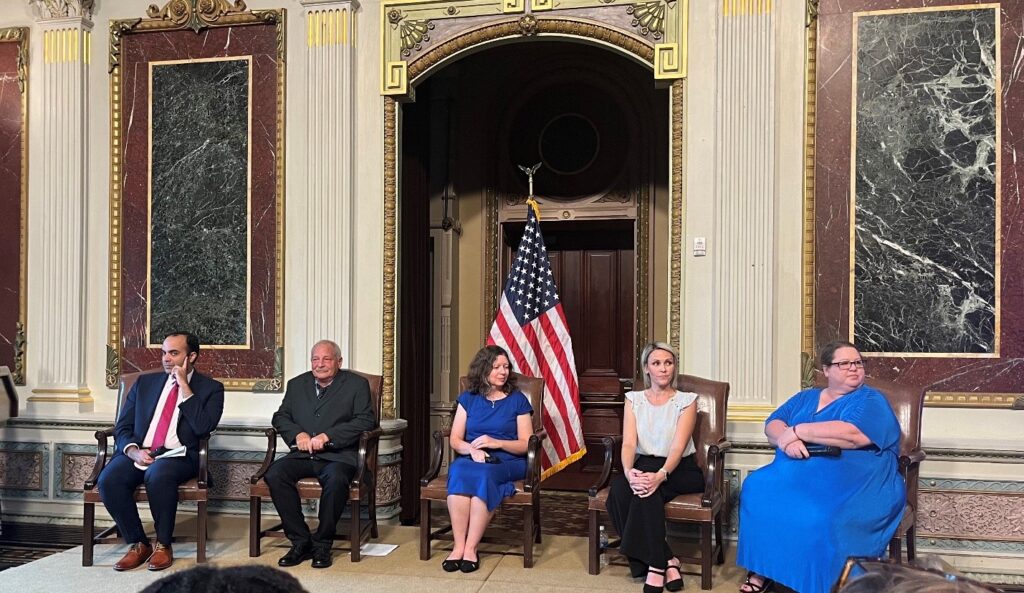Tuesday afternoon constituents shared impacts of medical debt crisis & what relief means
Wednesday, 10/02, Queens, NY – At a White House event yesterday hosted by Consumer Financial Protection Bureau (CFPB) Director Rohit Chopra, individuals impacted by medical debt were invited to share their stories, including one woman who has benefited from medical debt erasure and another who soon will.
In tandem, the White House released a Fact Sheet outlining new and ongoing actions to reduce the burden of medical debt on everyday people.
The testimony shared ranged from a Florida man who’d survived a house fire but was financially ruined by the resulting medical debt destroying his credit score to a woman whose young son survived a brain tumor but then found herself caught in the middle of the provider and insurance company facing hundreds of thousands of dollars in medical debt and a woman with multiple sclerosis who is unable to work and until recently found herself unqualified for Medicaid in North Carolina and facing an insurance deductible for hernia surgery she simply can’t afford.
The fourth participant, Amber, is an Undue Medical Debt relief recipient in Toledo, Ohio. Over $1,500 of medical debt was relieved for her family thanks to a partnership with the city of Toledo which is leveraging American Rescue Plan funds from the federal government to erase burdensome medical debts. Read more about Amber’s story here.
Darcy, the participant from North Carolina, also shared how thanks to that state’s pioneering efforts to tackle both existing medical debt and its causes, she will soon be eligible for Medicaid (after the state’s recent expansion) and will have her medical debt erased.
“I’m heartened by the brave testimony shared and heartbroken to hear these stories of how medical debt can upend a family’s life simply because someone was in accident, got sick or was born with a chronic condition” shares Undue Medical Debt CEO and president Allison Sesso. “The negative stigma attached to medical debt must be undone and I’m happy to see more action at the federal level to keep chipping away at this entrenched and complex crisis that is too often burdening our friends, neighbors and family.”
Latest Federal Actions on Medical Debt:
- The CFPB is taking aim at third-party debt collectors and released an Advisory Opinion clarifying “the responsibilities of debt collectors to confirm that debts are accurate, valid, and substantiated before engaging in collection actions. Further, the CFPB has stated that they will ensure fairness and increase transparency by cracking down on debt collectors that collect on debt that is not owed by patients.”
- Additionally, a consumer advisory was also released empowering patients to pushback when they feel they’re being improperly pursued for medical debt.
- The Department of Defense announced a proposal to overhaul how civilians are treated at military medical facilities to ensure people only pay what they can owe. The rule is still being finalized.
- The CFPB released a blog post shedding light on tax benefits enjoyed by nonprofit hospitals and insisting that more oversight is needed to ensure financial aid (i.e. charity care) is properly provided and billing issues are addressed.
- States are leading the charge on creating uniform standards for free or reduced care provided by nonprofit hospitals for qualifying individuals.
- And finally, from the Department of Health and Human Services, “For the first time, the Center for Medicare and Medicaid Services added new questions on medical debt to their Medicare Current Beneficiary Survey (MCBS). The MCBS is an annual survey of people covered by Medicare to better understand their health care needs. These new questions will provide essential background on levels of medical debt carried by seniors and those with disabilities and the impacts of these debts on their day-to-day lives.”
Closing out the event, Amber raised a crucial point relevant to the medical debt crisis; people need to have access to quality and affordable health insurance.
“I’d like to see that everyone has access to good insurance, not just having insurance and it won’t cover anything. People get so under water and it’s a shameful feeling. I’ve been a social worker for 20 years… and I couldn’t help myself out of medical debt. We need to make sure that everyone has equal opportunity to have good healthcare.”

